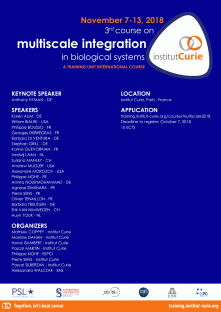Karen ALIM - Max Planck Institute, Göttingen (DE)
William BIALEK - Princeton University, Princeton (USA)
Philippe BOUSSO - Institut Pasteur, Paris (FR)
Georges DEBRÉGEAS - Université Pierre et Marie Curie, Paris (FR)
Barbara DI VENTURA - Heidelberg University, Heidelberg (DE)
Stephan GRILL - Technische Universität, Dresden (DE)
Karine GUEVORKIAN - Institut Curie, Paris (FR)
Liedwij LAAN - Delft University of Technology, Delft (NL)
Suliana MANLEY - École Polytechnique Fédérale de Lausanne, Lausanne (CH)
Alexandre MOROZOV - Rutgers University, New Brunswick (USA)
Andrew MUGLER - Purdue University, West Lafayette (USA)
Philippe NGHE - ESPCI, Paris (FR)
Armita NOURMOHAMMAD - Princeton University, Princeton (USA)
Agnese SEMINARA - Université Nice Sophia Antipolis, Nice (FR)
Pierre SENS - Institut Curie, Paris (FR)
Olivier TENAILLON - Université Paris Diderot, Paris (FR)
Barbara TREUTLEIN - Max Planck Institute, Leipzig (DE)
Erik VAN NIMWEGEN - Basel University, Basel (CH)
Huyn YOUK - Delft University of Technology, Delft (NL)

